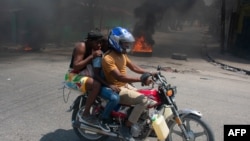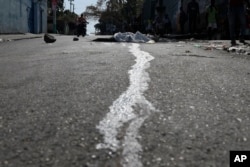Amid gunfire and a shortage of resources, humanitarians are reaching as many of the 5.5 million Haitians in need as they can with food, water and other life-saving assistance, but more access and money are required, the United Nations said.
"There is a very, very great fatigue. There is human suffering of an alarming scale. A lot of fear. Trauma. People are just simply tired," Ulrika Richardson, the U.N. resident and humanitarian coordinator for Haiti, told reporters Thursday in a video call from the Haitian capital, Port-au-Prince.
She said that in the first two months of this year, 2,500 people were killed, kidnapped or injured in the violence.
Haiti has been in turmoil since the July 7, 2021, assassination of President Jovenel Moise at his home in the Port-au-Prince suburb of Petion-Ville. Armed gangs now control much of the capital and have spread to other parts of the country. They have carried out massacres and kidnappings, human trafficking and sexual violence.
The situation has continued to unravel rapidly this month, with gangs trying to seize the country's largest airport and helping thousands of prisoners escape from jail.
Flights are grounded at the main airport, and only a few international flights are moving from Cap-Haitien in the north. Richardson said the seaport is under attack, but the Haitian National Police are in control of part of it.
"That's extremely good, because it means fuel is able to come out and basically be put to use in the capital," she said.
On Saturday, the U.N. Children's Fund, UNICEF, said one of its containers had been looted at Port-au-Prince's main seaport. It contained essential items for maternal, neonatal and child survival, including resuscitators and water equipment.
"That was extremely disastrous for our response," Richardson said.
The U.N. Office for the Coordination of Humanitarian Affairs (OCHA) said Thursday that it was keeping some supplies at the Port-au-Prince port, but they were at risk of being looted. U.N. agencies and nongovernmental organizations have more than 300 containers in Port-au-Prince, and they are in discussions with the authorities to secure them.
OCHA says it also needs air transportation and maritime services to scale up humanitarian operations.
Meanwhile, the World Food Program, the International Organization for Migration and UNICEF are delivering hot meals, blankets, solar lamps and thousands of gallons of drinking water to displaced people.
The World Health Organization and the Pan American Health Organization have been distributing water purification tablets, chlorine, gloves and other items at sites for displaced people. They are also providing medicines and supplies to the few health centers still operating.
And the U.N. Population Fund and its partners are assisting women and girls with matters related to sexual and reproductive health, as well as sexual and gender-based violence issues. Richardson said the gangs continue to rape women as both a method of control and revenge.
More than 1 million Haitians are teetering on the brink of conflict-related famine as funding for humanitarian programs is drying up. Only 6.5% of the $674 million the U.N. needs this year has come in.
The World Food Program hot meals program could run out of money in days.
"Unfortunately, if there's no money arriving to our humanitarian response plan, then we will simply need to reduce the level of assistance," Richardson said. "At this stage, it would be a catastrophe."





